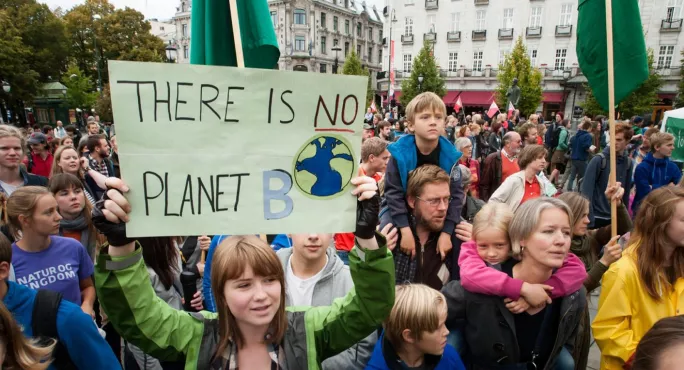- Home
- ‘Tackling the climate crisis must be a central focus of education’
‘Tackling the climate crisis must be a central focus of education’

Mid-March, geography teacher Mark Enser took to Tes to talk about climate change and the curriculum. In his article ’Stop putting all society’s problems on to schools’, Enser was critical of adults who support a petition launched by a group of students which asked for climate change to be prioritised on the national curriculum. He said that climate change was already on the curriculum and that demanding something be included in the national curriculum is too easy a response to societal problems.
Before assessing the arguments, I think it’s important to consider how serious you believe the climate and ecological crisis to be. Many people see the issue as complex, distant, uncertain and often a matter of values rather than facts. But even conservative reports, like the IPCC, tell us that we must make radical changes to every aspect of our lives to avoid devastating consequences in the near future. We will soon hit 2 degrees of warming and, if we do, it will not stop there. We are witnessing mass extinction of species and the collapse of ecosystems.
We seem unable to accept these reports: they are terrifying and accepting them will mean difficult choices. It is easier to ignore reality. But the crisis would be harder to ignore if taught appropriately in school.
This brings me to the first criticism of adults who support the petition: they should have bothered to actually look at the curriculum. A cursory glance, and they would see that climate change is already there. This is true. I’m a secondary school teacher and I have spent many hours trawling through the national curriculum. I have seen exactly how much coverage climate change and the ecological crisis receive. There is nothing in the national curriculum for key stages 1 or 2. The KS3 geography guidance might be taught through one or two modules. If students choose geography at GCSE, they will study the topic more. In science, students could hear about climate change in 4 or 5 lessons.
The students’ petition does not claim that climate change is not mentioned in the curriculum. Their claim is that they have “barely learned about the climate crisis”. Some argue that schools have to cover climate change because it’s on exam specifications. Yes, it is for science, but so fleetingly and amongst so many other sub-topics that students would never imagine it to be a phenomenon that will profoundly disrupt and potentially end human life on Earth.
Even the coverage in geography could only ever amount to one topic within one of many discrete subjects. The crisis our planet is facing cannot be reduced to one topic that any one subject can deal with. Facing it honestly must involve facing it in every aspect of the way we live, work and learn. We need to entirely re-think how our subject-divided, exam-focused system works. Climate change is a ‘wicked’ problem (interdisciplinary, constantly changing, non-linear) like most challenges in the real world. Isn’t it this that we should be preparing young people for?
This brings us to the second criticism directed at adults supporting the petition, that schools cannot be expected to deal with all the ills of society. In principle I agree, and schools alone cannot solve the climate crisis. But we are on a trajectory towards global crop failures, devastating weather events, mass migration and wars over resources; a crisis unprecedented in human history.
If people are unaware of the severity of the situation then they have not engaged with reality. It is too late to be polite about this. The fact that many people see this issue as peripheral or a kind of lifestyle choice for those inclined to care is evidence of the degree of public ignorance. Refocusing education to prepare young people for the future we are now facing could be an easy way out for those in power. But my view is that by acknowledging the seriousness of the climate crisis in schools and the curriculum, policymakers would be exposing themselves to public account. This is why it has not yet happened.
We all deny reality when it gets difficult. What we teach in schools is a reflection of what we, as a society, accept and believe about the world. We must face the truth and act accordingly. Our response must be radical and comprehensive - we must challenge what is acceptable and even what we believe to be possible. If we are going to reorganise society to mitigate and prepare for the effects of catastrophic climate change, we must begin with how and what we teach.
Tim Jones is a religious education and philosophy teacher in London
Keep reading for just £1 per month
You've reached your limit of free articles this month. Subscribe for £1 per month for three months and get:
- Unlimited access to all Tes magazine content
- Exclusive subscriber-only stories
- Award-winning email newsletters